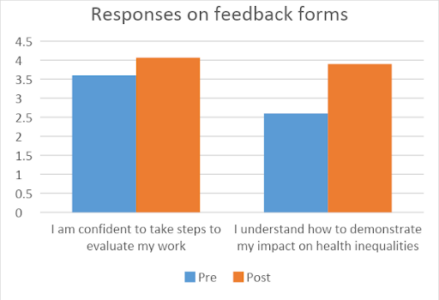What we did
Voluntary Health Scotland (VHS) supports the newly established Scottish Community Link Worker Network for Community Link Workers in primary care settings. Feedback from Community Link Workers (CLWs) over the last few months has shown that there is an appetite for learning and sharing experiences around evaluating their work. In order to support them with this, Voluntary Health Scotland approached Evaluation Support Scotland about running a half-day online workshop for CLWs.
The workshop, which took place on 9th December, focused on supporting community link workers to demonstrate their impact on tackling health inequalities. Nicola Swan, Evaluation Support Manager at ESS (pictured), prepared and delivered the session, while VHS promoted the event via the Scottish Community Link Worker Network. The session, which was based on the resource: Recognising our rich tapestry: measuring the contribution of third sector organisations to tackling health inequalities aimed to help community link workers to:
- Feel more confident to take steps to evaluate their work
- Better understand where to go for more information/support
- Better understand how to demonstrate their impact on health inequalities
There were spaces for up to 35 community link workers; demand was extremely high with places filling up within one week of promoting the workshop. 32 participants in total took part in the event.
Prior to the workshop, ESS asked participants what they would most like to gain from the session and they said:
- Understanding/learning/knowledge about demonstrating impact on inequalities
- Ideas on tools and methods in this area
- Better understanding of how other areas are evaluating their impact
One person said they were looking for:
guidance and direction on service measures and methods that demonstrate impact on health inequalities; How do I take the measures I have and present them in a way that shows impact on health inequalities?
What difference we made
We received 16 pre-course evaluation forms and 14 feedback forms from participants – this response rate is typical for online training.
Participants’ self-scoring shows that the session supported people to increase their confidence, to some extent, in demonstrating impact on health inequalities. However, the session made a more significant impact on participants’ understanding of how to evaluate their impact.

Their comments also reflected this:
I plan to take it into practice and use it when working with individuals to measure the progress I am making.
Packed with information and really does make you evaluate the outcomes you are using to document and present for future funding
[Will] make my reports show the outcomes in a better way
Several participants reflected that their next steps would be to:
1. Share their learning with their team:
I am thinking of running a local development session with the team. I think we could make improvements to how we evaluate locally and I think the way you demonstrated some of the points in the workshop will help us show how we are contributing to health inequalities
2. Use the tools provided (such as the logic model) to make a start on evaluating their work:
Set time aside & committing to work on using the logic model. Consider how we could better use and link our existing data (quantitative and qualitative) and to focus on what we want to evidence and to whom.
3. Try to capture other evidence of their impact (e.g. patient voices)
Look at reviewing the way we capture evidence to include the impact that the service has on patients that is not currently being captured.
Several participants expressed an interest in a follow up session with ample opportunity for peer learning:
I think it would be great to hear how those that have attended have moved on from here. What do their logic models look like and what are they measuring? I think it is really useful to share ideas and learn from others.
Really good session allowing for sharing of best practice and sharing of ideas especially from organisations that have been delivering the CLW service for longer. Would be very interested in attending something similar in the future.
What we learnt
About supporting Community Link Workers:
- There is a need for more support in this area. VHS reflected that we could run this workshop again and it would still be popular. The feedback told us some participants would like to catch up again about evaluation
- CLWs valued the opportunity to share experiences with each other. They felt the breakout rooms were helpful. Providing ample networking (with a light structure) works well to stimulate discussion
- Several mentioned the need to gather more patient voices/feedback from GPs (as a form of third-party feedback). Perhaps more support is needed to gather feedback from others and bring this together to analyse and report on impact. (By sharing the impact of the CLWs this may help to celebrate success and get others on board – such as GPs.)
About the Rich Tapestry Resource
- The content and tools were relevant for the group. They could see how their work related to reducing/tackling inequalities
About VHS and ESS working in partnership
- The two organisations have good experience of working together to promote events and resources around demonstrating impact on health inequalities. VHS brought their network and contacts and ESS brought evaluation experience. ESS could not have reached this audience without VHS.
We hope to follow up with the participants in a few months’ time to see how they have been getting on and how they are managing to apply what they learnt in their workplace.
Nicola Swan is Evaluation Support Manager at Evaluation Support Scotland.
